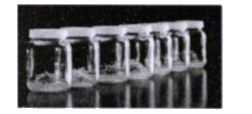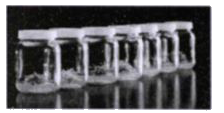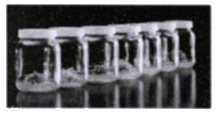Bacteria multiply at a rate proportional to the number present. If the original number N double in 3 hours, the number of the bacteria will be 4N is (in hours).
To solve the problem where bacteria multiply at a rate proportional to the number present, we can follow these steps:
Step 1: Set up the differential equation
Given that the rate of growth of bacteria is proportional to the number present, we can express this mathematically as:
dNdt=λN
where λ is a constant.
Step 2: Separate variables and integrate
We separate the variables to integrate:
dNN=λdt
Integrating both sides gives:
∫dNN=∫λdt
This results in:
lnN=λt+C
where C is the constant of integration.
Step 3: Solve for the constant C
At t=0, let the initial number of bacteria be N0. Substituting these values into the equation:
lnN0=λ⋅0+C⟹C=lnN0
Thus, we can rewrite our equation as:
lnN=λt+lnN0
Step 4: Simplify the equation
Rearranging gives:
lnN−lnN0=λt⟹ln(NN0)=λt
Step 5: Use the doubling condition
We know that the bacteria double in 3 hours. Therefore, when t=3:
N=2N0
Substituting this into our equation:
ln(2N0N0)=λ⋅3⟹ln2=3λ
From this, we can solve for λ:
λ=ln23
Step 6: Find the time when the bacteria are five times the original
We want to find t when N=5N0:
ln(5N0N0)=λt⟹ln5=λt
Substituting the value of λ:
ln5=ln23t
Solving for t:
t=3ln5ln2
Final Result
Thus, the number of hours it will take for the bacteria to become 4N is:
t=3ln5ln2
Given that the rate of growth of bacteria is proportional to the number present, we can express this mathematically as:
dNdt=λN
where λ is a constant.
We separate the variables to integrate:
dNN=λdt
Integrating both sides gives:
∫dNN=∫λdt
This results in:
lnN=λt+C
where C is the constant of integration.
At t=0, let the initial number of bacteria be N0. Substituting these values into the equation:
lnN0=λ⋅0+C⟹C=lnN0
Thus, we can rewrite our equation as:
lnN=λt+lnN0
Rearranging gives:
lnN−lnN0=λt⟹ln(NN0)=λt
We know that the bacteria double in 3 hours. Therefore, when t=3:
N=2N0
Substituting this into our equation:
ln(2N0N0)=λ⋅3⟹ln2=3λ
From this, we can solve for λ:
λ=ln23
We want to find t when N=5N0:
ln(5N0N0)=λt⟹ln5=λt
Substituting the value of λ:
ln5=ln23t
Solving for t:
t=3ln5ln2
Thus, the number of hours it will take for the bacteria to become 4N is:
t=3ln5ln2
Topper's Solved these Questions
Similar Questions
Bacteria increases at the rate proportional to the number of bacteria present. If the original number N doubles in 3 hours, find in how many hours the number of bacteria will by 4N ?
View SolutionIn a certain culture of bacteria, the rate of increase is proportional to the number present. If it is found that the number doubles in 4 hours, find the number of times the bacteria are increased in 12 hours.
View Solution
Knowledge Check
- Question 1 - Select One
The rate of increase in the number of bacteria in a certain bacteria culture is proportional to the number present. If in 5 hrs the number triples, then in 10 hrs, the number of bacteria present is
A18 times the originalB12 times the originalC6 times the originalD9 times the original - Question 2 - Select One
Read the following text and answer the following questions on the basis of the same: The rate of increase in the number of bacteria in a certain bacteria culture is proportional to the number present. Given that the number triples in 5 hours.

If 'N' is the number of bacteria, the corresponding differential equation is ____________ .AdNdt=KtBdNdt=KNCdKdt=NDdKdN=t - Question 3 - Select One
Read the following text and answer the following questions on the basis of the same: The rate of increase in the number of bacteria in a certain bacteria culture is proportional to the number present. Given that the number triples in 5 hours.

The bacteria becomes 10 times in ___________ hours.A5log7B5log10log3C5log3Dlog(1053)
Bacteria multiply at a rate proportional to the number present. If the original number N double in 3 hours, the number of the bacteria will be 4N is (in hours).
View SolutionThe rate of growth of bacteria is proportional to the number present . If initially, there were 1000 bacteria and the number doubles in 1 hours. Find the number of bacteria after 212 hours . [ take √2=1.414]
View SolutionThe rate of increase in the number of bacteria in a certain bacteria culture is proportional to the number present. Given the number triples in 5 hrs., find how many bacteria will be present after 10 hours. Also find the time necessary for the number of bacteria to be 10 times the number of initial present. [Given loge3=1.0986, e2.1972=9 ]
View SolutionRead the following text and answer the following questions on the basis of the same: The rate of increase in the number of bacteria in a certain bacteria culture is proportional to the number present. Given that the number triples in 5 hours.

If N0 is the initial count of bacteria, after 10 hours the count is __________ .View SolutionIf the bacteria in a culture increase continuously at a rate proportional to the number present and initial number is N, then the number present at time t is
View Solution

